International Metropolis Conference 2019: Final report
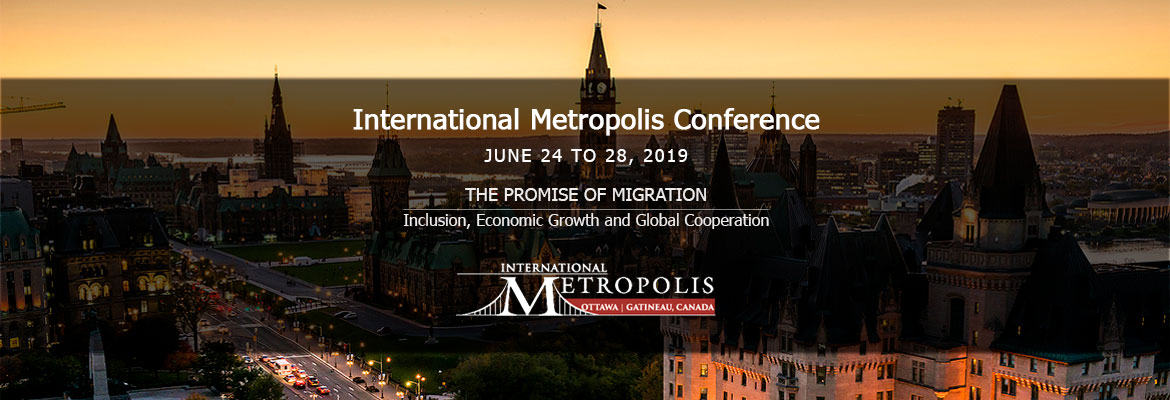
On behalf of Immigration, Refugees and Citizenship Canada, the International Steering Committee and the International Metropolis Project team, we would like to thank everyone who attended. We hope you enjoyed the conference program, cultural moments/experiences, social events and all that Ottawa had to offer.
Table of contents
- The conference in brief
- Pre-conference symposium overview
- Keynote address overview
- Plenary sessions overview
- Plenary 1 –The Quest for Global Governance: Compacts and Sustainable Development
- Plenary 2 – South-South Migration
- Plenary 3 – The Economic Impact of Immigration
- Plenary 4 – Non-State Actors and the Migration Industry
- Plenary 5 – Internally Displaced Persons
- Plenary 6 – The Effects of Technology on Migration and Integration
- Plenary 7 – Cities and Migration
- Plenary 8 – Public Confidence in Migration
- Workshops overview
- Feedback from delegates
- Media coverage
- Statistics
The conference in brief
The International Metropolis Conference 2019 set out to increase Canadian visibility and demonstrate leadership on migration issues as well as discuss effective global cooperation, strengthen relationships with international organizations and migration practitioners. Departmental priorities included shaping the agenda to reflect Canada’s migration-related policy priorities and create new ties with academics and government officials.
The Conference successfully leveraged the Canadian and global expertise to capture best practices on a broad range of topics from demystifying the Global compact to irregular migration. Featured panelists skillfully addressed discourse regarding refugees and migration, with the aim of reducing the current global tendency toward xenophobia and anti-migrant populist sentiments.
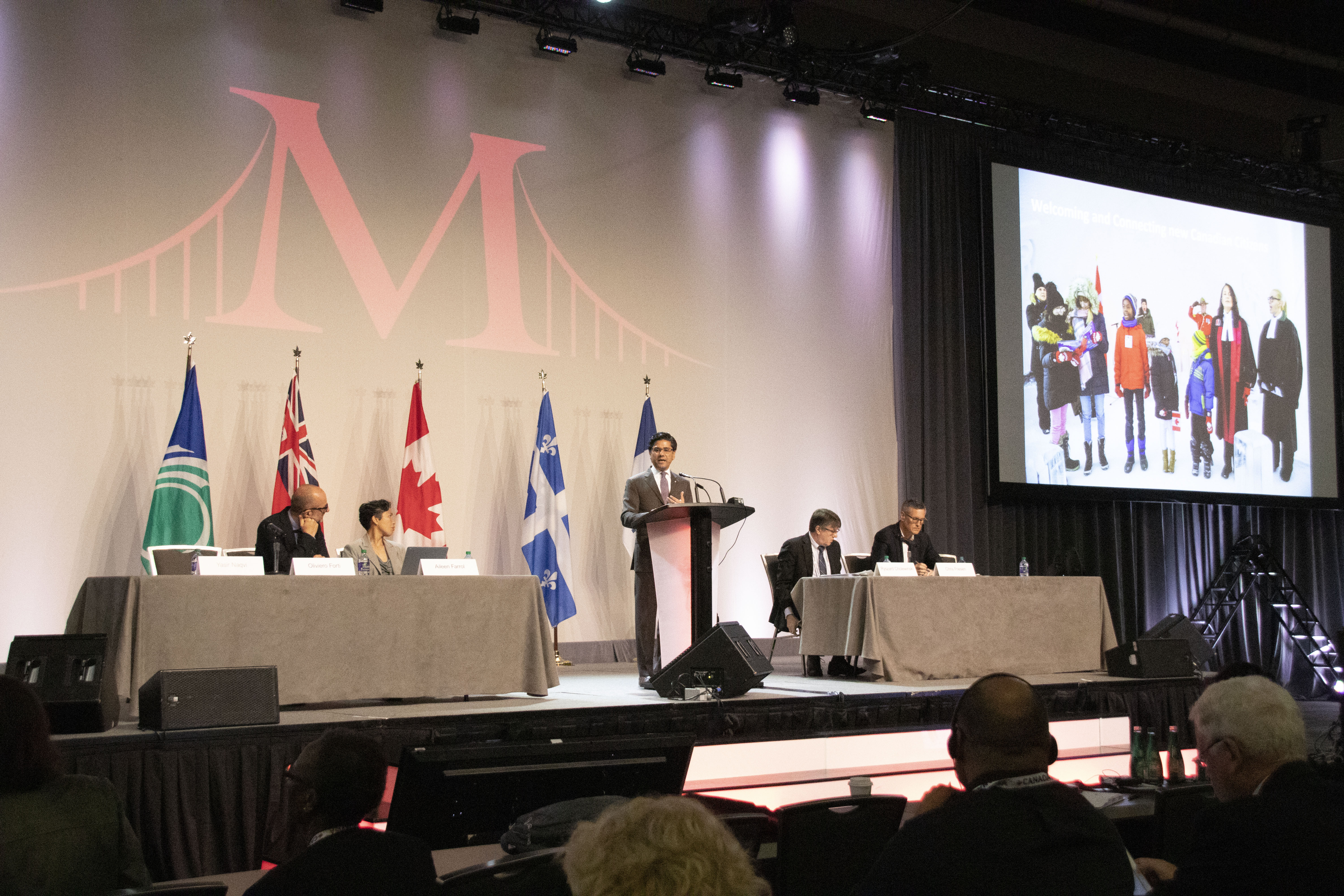
Metropolis stage - plenary session
June 24th kick-started with a series of pre-conference activities, including 13 study tours held in various parts of the city, a networking lunch and a special PhD workshop. The day opened with a special symposium hosted by the Canadian government, The Promise of Migration: A Canadian Perspective, which was extremely popular and for which demand for seating exceeded the supply.
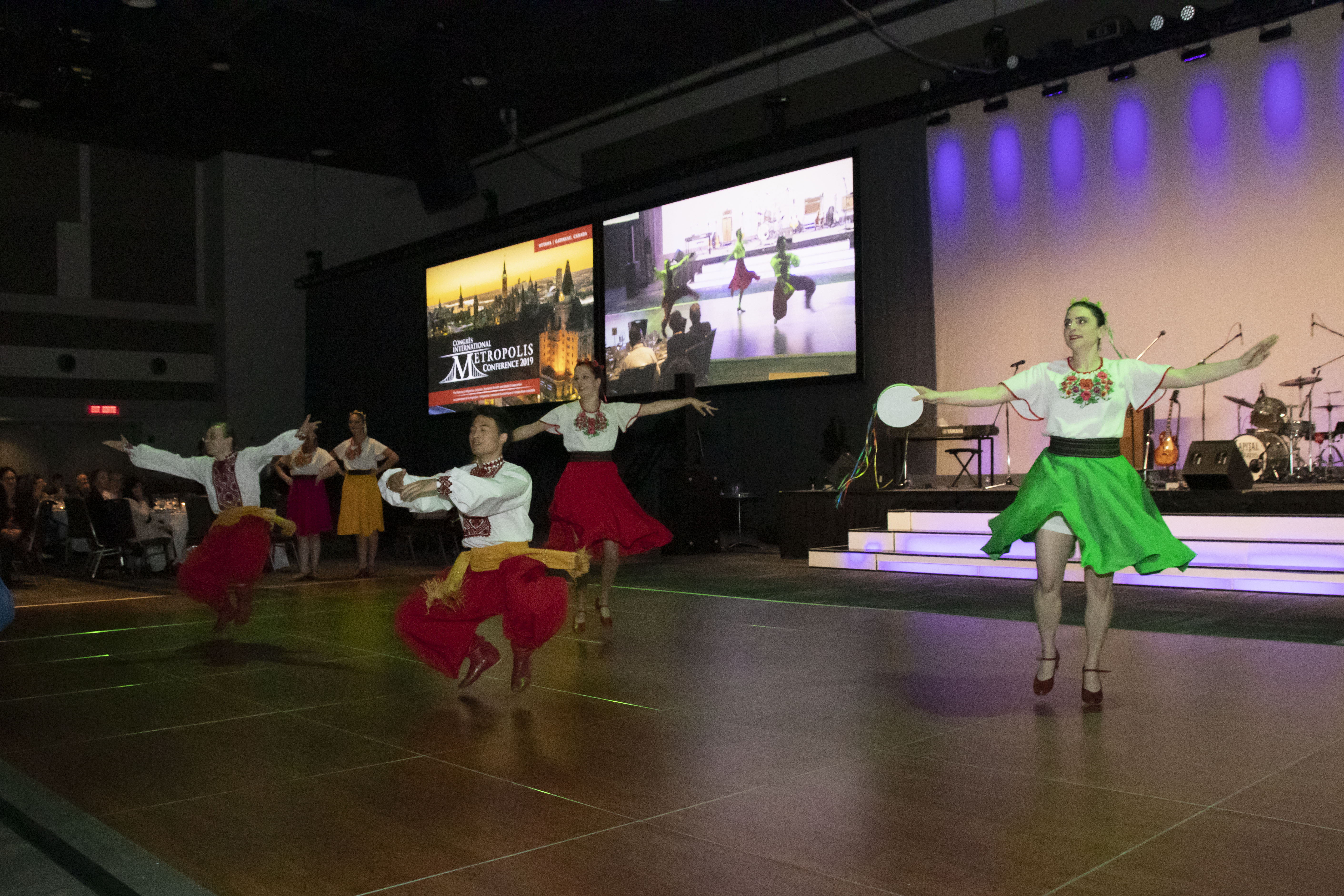
Ukranian dance group
Given the ambitious scope of the Conference’s theme The Promise of Migration: Inclusion, Economic Growth and Global Cooperation, content was structured around eight separate plenaries, each of which addressed a particular challenge of migration. Chairs and panelists were carefully selected based on their expertise, each of whom brought a diverse perspective and contributed to well-balanced content.
Each day commenced with a keynote address; all of which were extremely well received and lauded for their candor and audience engagement. Both Gilbert Whiteduck (Kitiganzibi First Nation) and Ketty Nivyabandi (Human rights defender) were given standing ovations after they delivered sobering and powerful remarks.
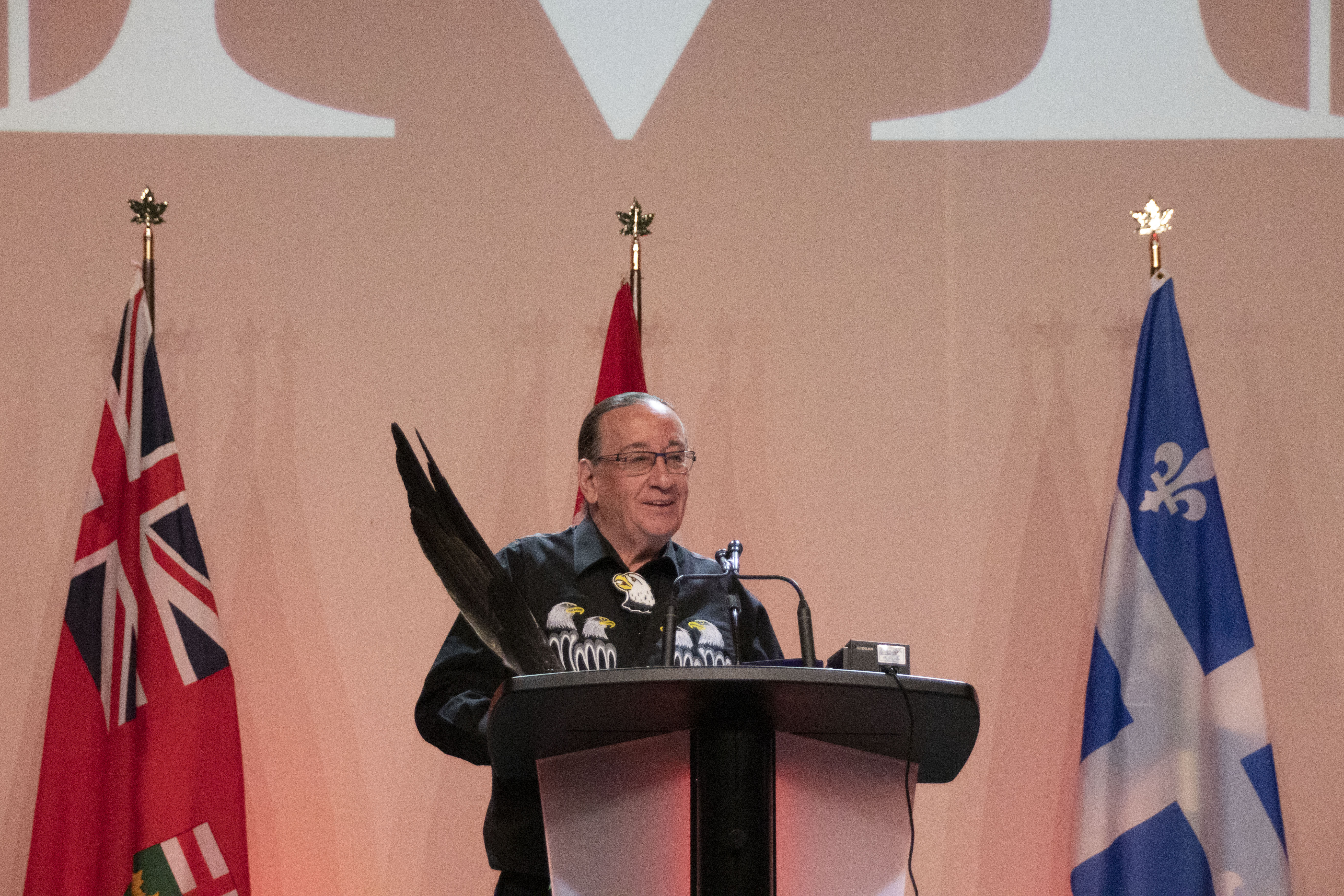
Gilbert Whiteduck
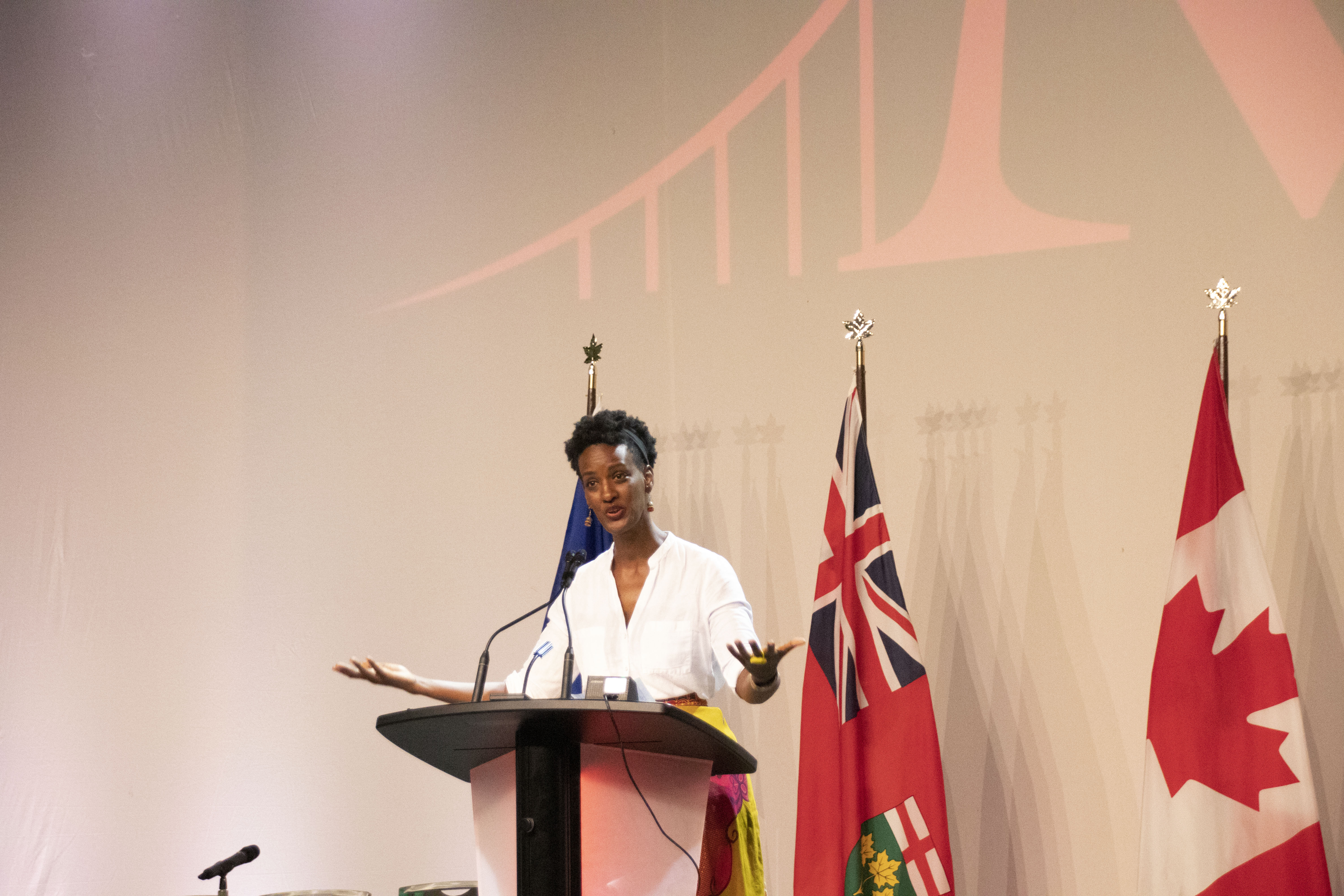
Ketty Nivyabandi
Throughout the week 174 individual workshops were held. Noteworthy subjects included migration data innovation, global responses to the mass displacement of Venezuelans, addressing anti-immigrant rhetoric, youth violence, settlement, integration and language barriers for newcomers.
To complement the information-dense agenda, a number of cultural and social events were held. Each morning before keynotes addresses were delivered, a different Canadian cultural performance was presented. These reflected the rich musical traditions of the Indigenous peoples, the Inuit, the francophone community and the Royal Canadian Mounted Police.
On select evenings, the conference held social and cultural events, from a networking reception to a formal gala. A Ukrainian dance group, opera singer Steve Michaud, the IRCC choir and the Capital Beatles band all captivated attendees. Midweek, delegates were offered the option of attending either the Orchestre Symphonique de Gatineau for a classical music performance with a repertoire including composers from around the world, or Pier 21, the musical. Both events were energetically applauded.
Pre-conference symposium overview
The pre-conference symposium The Promise of Migration: A Canadian Perspective was organized by IRCC and focused on some of the conference’s main migration themes. The symposium included 3 workshops:
The opening workshop, Challenges and Departmental Priorities, addressed some of the major international and national challenges that are transforming the Canadian migration landscape. Senior members of the Public Service of Canada, including Lori MacDonald, Acting Deputy Minister, IRCC, and Marta Morgan, Deputy Minister of Foreign Affairs, Global Affairs Canada, talked about departmental priorities for addressing them and explained current and future changes in the field of migration policies.
The workshop that followed, Recent Evolutions and Perspectives on Canadian Immigration Policies, addressed migration-related matters such as the selection of economic migrants, humanitarian programming, the reception and integration of migrants, and the strengthening of underlying data and research. Several IRCC senior managers presented recent changes in migration policies and programs that were made in response to these challenges.
The last morning workshop, Improving Our Process and Policies to Meet Tomorrow’s Challenges, discussed how the challenges ahead and recent changes in our policies go hand in hand with new improvements to our processes. Also discussed were IRCC’s projects to meet future challenges, from developing more customer-focused services, to better managing identities and data, to transforming our digital policy.
Promise of migration: A Canadian perspective – Presentations
Read or download the PDF presentations from the Promise of Migration: A Canadian Perspective special event on June 24, 2019.
- Canada’s Managed Migration Model (PDF, 144 KB)
- Economic Immigration in Canada (PDF, 331 KB)
- Complementary Pathways for Refugees: A Canadian perspective (PDF, 300 KB)
- Canada’s Settlement and Integration model (PDF, 452 KB)
- Citizenship (PDF, 606 KB)
- Canada’s International Leadership in Response to Global Migration Trends (PDF, 455 KB)
- Canada’s Approach To Managed Migration: Migration Health (PDF, 245 KB)
- Introduction to the Transformation & Digital Solutions Sector (PDF, 231 KB)
- Insights (PDF, 23 KB)
PhD seminar presentations
Read or download the presentations from the PhD Seminar held on June 24, 2019.
Keynote addresses overview
The keynote speakers were from various backgrounds: Gilbert Whiteduck; Ketty Nivyabandi; Matt DeCourcey; the Honourable Ahmed D. Hussen, M.P., Minister of Immigration, Refugees and Citizenship; Valérie Plante and His Excellency Ambassador Juan José Gómez Camacho. All of them spoke about different aspects of migration; the history, the present and the future. Dr. Daniel Hiebert was the general rapporteur and provided an overview of the conference.
Gilbert Whiteduck, leader of the Kitigan Zibi Anishinabeg First Nation, a community of the Algonquin First Nation, reminded participants that while “Canada prides itself on being a welcoming society, the Indigenous people were the first to welcome European settlers, and this hospitality is ever-present today.” He held out hope that for “Canada to become its best self, it must face its colonial past,” and that “Canada is, and will always be, a work in progress.”
Watch the video: Gilbert Whiteduck
Matt DeCourcey, M.P., Parliamentary Secretary to the Minister of Immigration, Refugees and Citizenship, spoke about Canada and its policies surrounding migration with emphasis on the fact that people have to be understanding to why people migrate. He stated that “Canada is a country of newcomers.”
Watch the video: Matt DeCourcey
Distinguished Professor Paul Spoonley, Co-Chair of the International Metropolis Steering Committee, welcomed the delegates, thanked the Government of Canada for being the host, and on behalf of the Māori indigenous people of New Zealand, paid homage to the Algonquin Nation representatives.
Watch the video: Paul Spoonley
The Honourable Ahmed Hussen, Minister of Immigration, Refugees and Citizenship, discussed his pride in “the government’s example that you can be both strong and effective at providing security to citizens while being compassionate to refugees.” He argued that “Canada is not immune to the anti-immigrant sentiment, but the best weapons against fear are facts.”
Watch the video: Minister Hussen
A former refugee herself, Burundian poet and human rights activist Ketty Nivyabandi pointed out that the globe today has a crisis of empathy and compassion that is leading us to become more inhumane. She stated that wars create refugees and so, if people are anti-refugee, they should at least be anti-war. Moving forward, she left the audience with 3 ideas she curated through her experiences: be creative, have a feminist approach to migration and displacement, and instill the sense of extreme urgency when implementing the work.
Watch the video: Ketty Nivyabandi
Valérie Plante, Mayor of Montréal, passionately advocated for the role of her city, and of cities more generally, in bridging the divide between policy and migrants, strategically difficult from a national or individual level. Cities are uniquely placed to address underlying biases, lowering inequality between migrant and host populations and addressing global challenges that cause displacement and international movement.
Watch the video: Mayor Valérie Plante (available in French only)
His Excellency Ambassador Juan José Ignacio Gómez Camacho, Ambassador to Canada for the United Mexican States, ended as the final keynote speaker and synthesized the various discussions that happened over the few days of the conference. He addressed the fact that migration is always going to be a topic of concern and that despite the UN not being able to fully comprehend it in the beginning, the world has collectively worked and brought together the Global Compact. Further, he reiterated that the Global Compact for Migration is necessary as it looks at migration from 360 degrees because everything is so interconnected.
Watch the video: Ambassador Camacho
Plenary session overview
Transcripts of video presentations, in the language of delivery, are available upon request.
Plenary 1 – The Quest for Global Governance: Compacts and Sustainable Development Goals
The opening plenary featured representatives from various sectors and addressed a broad but rather important area in the discussion of global migration and refugee issues. Chaired by the UNHCR’s Jean-Nicolas Beuze, panelists emphasized the importance of international cooperation and various, even conflicting points of view. They raised concerns on the narrative that projects migration as unregulated and unsafe instead of as a social norm that humans as a species have been practicing for thousands of years.
The panel touched on the human, social, organizational, policy and other aspects of migration that can help make or break the perspective that we generate. Participants reminded us that while it is far from a perfect document, the Global Compact for Migration is the first attempt at a comprehensive framework for governing international migration.
Watch Plenary 1 videos
There are no presentations available from Plenary 1.
Plenary 2 – South-South Migration
Chaired by Diego Beltrand, Regional Director, South America, for the International Organization for Migration, the second plenary expanded on the challenges, practices and narrative surrounding migration in the global south. This plenary and its speakers emphasized the importance of understanding the south-south migration patterns that constitute a huge chunk of the global migration trend. Because 66% of total migration takes place in a south-south context, situational awareness in policymaking and aid allocation is key for short-term efficiency and long-term success.
Ambassador Santiago Chávez, Vice Minister of Human Mobility, discussed the need for a unified philosophy among southern states to address migration. Prof. Silvia Núñez García, former Director of the Center for Research on North America (CISAN) at the National Autonomous University of Mexico, drew attention to the U.S.–Mexico border, and reiterated the important role of media discourse in creating polarizing immigration narratives. Prof. Andrew Gardner of the University of Puget Sound delivered some aspects of his research on migration to Gulf countries, particularly the less publicized fact that “southern” states face the largest global flow of transnational migration.
Watch Plenary 2 videos
- Plenary 2
- Diego Beltrand
- Santiago Chávez (available in Spanish only)
- Silvia Núñez García
- Andrew Gardner
- Linda Adhiambo Oucho
Read or download Plenary 2 presentations
Plenary 3 – The Economic Impact of Immigration
Chaired by Paul MacKinnon, IRCC’s Assistant Deputy Minister for Strategic and Program Policy, this plenary examined the benefits and pitfalls of economically integrating immigrants into local communities. The role that immigration plays in the service industry in developed countries, as well as immigrants as consumers who can have a positive impact on the economy, were some of the relevant balances that were brought forth. Some of the major points discussed in the plenary touched on an important observation about the almost neutral effect of immigration on the economy of the host nation.
There was an interesting contrast between the speakers’ interpretation of existing data, which paralleled their specializations in both micro and macroeconomics. The plenary touched on a wide array of micro and macroeconomic impacts of immigration.
Watch Plenary 3 videos
- Opening RCMP band
- Plenary 3
- Paul MacKinnon
- Ekrame Boubtane(available in French only)
- Amelie F. Constant
- David Green
- Michael Van der Cammen
Read or download Plenary 3 presentations
Plenary 4 – Non-State Actors and the Migration Industry
In the next plenary of the second day, moderator Yasir Naqvi, Chief Executive Officer, the Institute for Canadian Citizenship, prompted speakers to answer 2 key questions. First, on the challenges and solutions faced by the organization, and second, on collaboration efforts with other industry partners to better protect migrants.
The importance of collaboration between the public and private sectors was a strong theme throughout the discussion, particularly with emphasis on increased use of technology. A lot of emphasis was placed on a change in the attitude towards migration to change the narrative and the need to be more sympathetic and empathetic for a real change.
Watch Plenary 4 videos
Read or download Plenary 4 presentations
Plenary 5 – Internally Displaced Persons
The panelists in the third day’s first plenary, also chaired by Jean-Nicolas Beuze, discussed the importance of giving more direct attention to internally displaced persons (IDPs), as compared to the far greater attention given to migrants and refugees. Currently, there are more than 40 million IDPs, who will be highly vulnerable in conflict situations. The panelists emphasized that IDPs are impacted in the long term as most of them are not able to return home. They pointed out that there is a lack of resources and few policies directed towards IDPs, and that more research, monitoring and creative approaches to displacement need to be established.
Read or download Plenary 5 presentation
Plenary 6 – The Effects of Technology on Migration and Integration
This plenary, chaired by Ümit Kiziltan, Director General, Research and Evaluation, IRCC, focused on the potential uses, misuses and missed uses of technology within the migration industry and beyond. The speakers provided multi-sectoral perspectives on this issue, which is often seen as a threat and weapon of control.
The propagation of fake news was a central theme among the panelists. It was found that in general, those who are more anti-immigrant are more active on social media than those who are pro-immigrant. Misinformation resonates in echo chambers and is polarizing the migration debates, and although digital misinformation is not behind the increase in anti-immigrant feelings, it is increasing the divide.
Watch Plenary 6 videos
Read or download Plenary 6 presentation
Plenary 7 – Cities and Migration
Chaired by Maxime Pedneaud-Jobin, Mayor of Gatineau, this plenary addressed social integration in the urban context. Panelists discussed how to influence international discourse and priorities for cities to create better outcomes for communities, migrants and refugees. Anna Visvizi, Head of Research, Research and Innovation Institute, and Associate Professor, Deree College, the American College of Greece, explored both the challenges and the opportunities in creating smart cities—and how leveraging technology can increase sustainability, foster economic development and enhance quality of life factors for newcomers.
Other speakers contributed global perspectives from individual municipalities and provided an overview of the challenges certain cities face and how municipal governments are at the forefront of integration efforts. Gioconda Herrera, Professor, the Latin American Faculty of Social Sciences (FLACSO) in Ecuador provided an overview on the complexities faced by Quito and other densely populated municipalities in hosting Venezuelan refugees.
Read or download Plenary 7 presentation
Plenary 8 – Public Confidence in Migration
Canadian Broadcasting Corporation News. Keith Neuman, Executive Director, Environics Institute, stated that Canada consists of a “culture of accommodation,” which makes assimilation easier. Although there may be criticisms of people in Canada having a weak national identity, it can be framed instead as one of the strengths of Canada that enables people to be welcoming and others to feel like they belong.
Dr. Abel Chikanda, Assistant Professor, Geography and Atmospheric Science, and African and African-American Studies, University of Kansas, informed the audience about the myths concerning immigrant Africans in South Africa, and how xenophobia has affected immigrants’ businesses in the country.
Rob McNeil, Researcher for COMPAS UK, pointed out that the discourse about “us versus them” has been ongoing for 12,000 years. The panelists agreed that we collectively need to go to community level and engage with people for them to understand the experiences of migrants.
Read or download Plenary 8 presentation
Closing statement
Watch the closing statement by Dan Hiebert
Workshops overview
The conference program offered a total of 174 workshops that were delivered from June 25 to June 27, 2020. This is the highest number of workshops ever offered at the International Metropolis Conference, which has taken place every year since 1996.
The requirements for workshop submissions included 3 main criteria:
- cross-sectoral participation (that is, research/academia, practitioner/NGO and policy);
- representation from more than 1 country;
- a focus on migration, integration and/or population diversity. It is estimated that more than 50% of the workshops in the program met all 3 conditions.
The focus on migration, integration and/or population diversity was rich and revealed areas of inquiry, practice and policy that were largely received by the delegates as very high quality.
Cross-sectoral representation and international participation were more difficult to achieve. This was due to structural limitations that International Metropolis Conferences have worked to alleviate through the years: cross-sectoral disconnection in the respective areas of activity and the lack of platforms where international exchanges are accessible to policy-makers, researchers and practitioners, at all levels of professional engagement.
However, the program structure at this conference allowed for ample opportunities for networking and potential collaborations and partnerships going forward, which was welcomed by all delegates.
Presentations are available upon request.
Number of workshops per topic
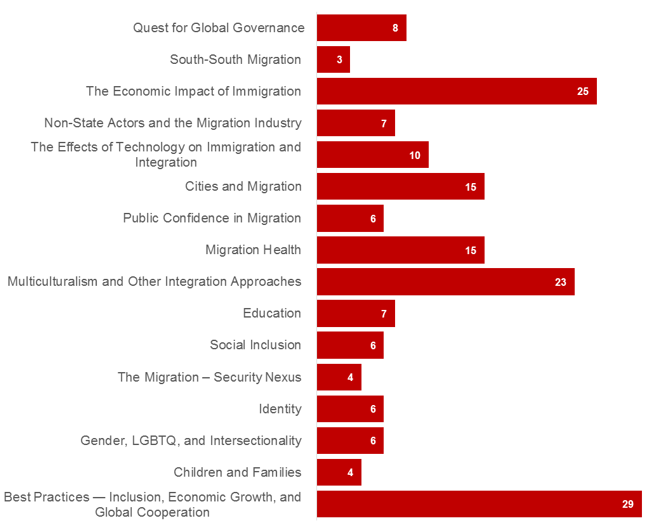
Alternative text: Number of workshops per topic
| Topic | Number of workshops |
|---|---|
| Best Practices ― Inclusion, Economic Growth, and Global Cooperation | 29 |
| Children and Families | 4 |
| Gender, LGBTQ, and Intersectionality | 6 |
| Identity | 6 |
| The Migration – Security Nexus | 4 |
| Social Inclusion | 6 |
| Education | 7 |
| Multiculturalism and Other Integration Approaches | 23 |
| Migration Health | 15 |
| Public Confidence in Migration | 6 |
| Cities and Migration | 15 |
| The Effects of Technology on Immigration and Integration | 10 |
| Non-State Actors and the Migration Industry | 7 |
| The Economic Impact of Immigration | 25 |
| South-South Migration | 3 |
| Quest for Global Governance | 8 |
A series of workshops were the result of special initiatives and partnerships involving diverse stakeholders and attracting a high number of audiences, including:
- Examining the International Response to the Mass Displacement of Venezuelans throughout Latin America;
- Skilled Migration and Labour Market Integration: What Do Canada and Germany Have in Common?
- Canada’s Operation Syrian Refugees (OSR)
- Political Participation of Refugees ― Loopholes and Opportunities

In general, attendance at all the workshops in the program ranged from 5 to 30 people. Overall, the high number and quality of workshops reflected the high interest in migration, integration and population diversity in Canada by traditional stakeholders (academia, civil society, government). The private sector lagged behind strikingly, with very few representatives participating in the conference.
While promotion of the conference to established networks nationally and internationally, commonly outside of the private sector, may have played a role, it is also a reflection of the need for traditional stakeholders to engage with this sector in a more sustained manner, whether in Canada or abroad.

Feedback from delegates (anonymous)
“I have participated on several international conferences but the International Metropolis Conference 2019, Ottawa, completely exceeded my expectation [i]n so many aspects.”
“Very well organized! Terrific quality throughout! [N]ice mix of subjects!”
“I thought it was one of the best Metropolis Conferences that I have attended. The presentations, both in workshops and plenaries, were excellent and well worth the expense and travel.”
“A truly inclusive and diverse conference. An outstanding effort from organizers.”
“Excellent conference very well organized, wonderful Canadian welcome. There was an excellent mix of research, policy and practice in the Conference sessions and workshops whereas usually research dominates to the detriment of policy and practice.”
“My expectations were high, but they were exceeded! The plenary themes, genuine/inspirational keynotes, first nations' involvement, the open discussion, thoughtful Conference organization, the tech used (Slido, Conf app) were all excellent. Without any hesitation, the best migration conference I have attended.”
“Thank you for a very well organized and welcoming Conference. It was a privilege to attend among so many experts and to learn from Canada's experience in developing policy and practice in the area of migration. It was an unforgettable experience both professionally and personally.”
“Really enjoyed hearing from mayors of Montreal and Gatineau. Conference preparation was excellent. The venue was very convenient and well suited to the Conference. Overall, a very worthwhile Conference.”
“The Conference was really well organized, and I felt well taken care of at all stages. IT was very enriching and incredibly friendly and organized.”
“I found the welcome and the care amazing (BRAVO to the team). I found it very relevant to have this conference in Canada as it has developed interesting approaches to migrations that we could learn from in Europe. Thank You for the experience.”
“This was one of the most productive conferences I have attended (inspiration, networking, presenting, possible future collaborations and work opportunities). Expensive, but worth it.”
“Great plenary sessions. Very happy with the recognition of indigenous people's part in migration debates. Great keynotes. Great workshops. Fascinating city. Great networking.”
“So very refreshing to discuss the challenges of international migration in such a productive and constructive context. And the gala evening blew me away... well done and thank you.”
“Great variety of speakers/topics and great international flavor to the Conference. Kudos!”
“The best Metropolis Conference ever!”
“Very impressed. Logistics and organization were seamless. Speakers were world class. Highlighting of Indigenous culture and territory felt genuine and respectful. Was reinspired. Thank you!”
“Plenary speakers were inspiring and so were all the Chairs for the plenaries. Plenary 8 was quite a treat.”
“I was impressed by the energy and dedication of the International Metropolis' organizing team. They were engaging and dedicated from start to finish, and incredibly professional. Thank you.”
“The plenaries and overall Conference organization were superb. I was impressed by the amount of thought that went into the week's activities and helping delegates to visit Ottawa and Gatineau.”
“What an exceptional international conference. Amazing work everyone. I look forward to attending next year's conference. Thank you.”
Media coverage
Social Media Content
| Week June 21 – 27 |
Twitter (n=2) | Facebook (n=2) | LinkedIn (n=2) | Total |
|---|---|---|---|---|
| Impressions (views) | 8,853 | 106,348 | 5,584 | 120,785 |
| Link clicks | 23 | 115 | 71 | 209 |
| Shares | 4 | 9 | 5 | 18 |
| Likes | 17 | 351 | 32 | 400 |
| Cumulative Feb 12 to June 27 |
Twitter (n=56) | Facebook (n=40) | LinkedIn (n=36) | Total |
|---|---|---|---|---|
| Impressions (views) | 846,360 | 2,655,736 | 154,339 | 3,656,435 |
| Link clicks | 940 | 5,379 | 2,807 | 9,126 |
| Shares | 194 | 448 | 77 | 719 |
| Likes | 267 | 7,839 | 888 | 8,994 |
Social media analysis
Twitter was the main contributor for coverage, generating 98% of mentions. Coverage around Metropolis mostly included shares and retweets.
The most frequently used hashtags included #IntlMetropolis2019 (2K mentions), #Migration (264 mentions) and #WithRefugees (260 mentions). The #WithRefugees hashtag was used in conjunction with UNHCR Canada, which hosted a session at the conference. The comments that stemmed from the post focused on bringing awareness to refugees in Turkey with #StandWithIraqiRefugees.
UNHCR Canada provided a significant amount of coverage throughout the conference as well as leading up to the conference. They shared a post at the end of May promoting the conference. The message pulled in 96 comments, which included #StandWithIraqiRefugees.
Additional conversation around the event included posts from Ottawa Tourism, IRCC and Carleton University News regarding their contribution at the conference.
Among the Metropolis coverage were tweets about Minister Hussen’s appearance at the conference. The tweets were mostly positive in sentiment, with some using #ImmigrationMatters as part of their posts.
The top 3 influencers who shared the most mentions of the conference included:
- Ottawa Local Immigration Partnership (@OLIP_PLIO)—posts consisted of shares from UNHCR Canada referencing the various discussions that took place at the conference.
- Սարին/Sarine (@lifeindiaspora)—posts consisted of shares from UNHCR Canada showcasing the Mayor of Montréal giving her keynote speech at the conference. Comments included #StandWithIraqiRefugees.
- IMC_2019 (@IMC_2019)—posts consisted of retweets and shares of attendees sharing their experience at the conference.
Facebook and Instagram pulled in 1% of the remaining mentions.
Press publication
The Metropolis 2019 conference received media coverage from:
- Eco Latino: Ottawa-based Spanish weekly print publication
- TLN TV
- OMNI TV
Videos:
- TLN: Interview with Diego Beltran, Enrico del Castello, Minister Hussen, Fabio Baggio (available in Spanish only)
- TLN: Interview with Enrico del Castello (Spanish) and Minister Hussen (English)
- TLN: Interview with Minister Hussen and Enrico del Castello (available in English only)
- OMNI News: Interview with Director Enrico del Castello (available in Italian only)
- OMNI News: Interview with the Manager, Migration Policies and International Protection, Oliviero Forti (available in Italian only)
- OMNI News: Interview with Rev. Fabio Baggio, Undersecretary of State for Refugees of the Vatican (available in Italian only)
Statistics
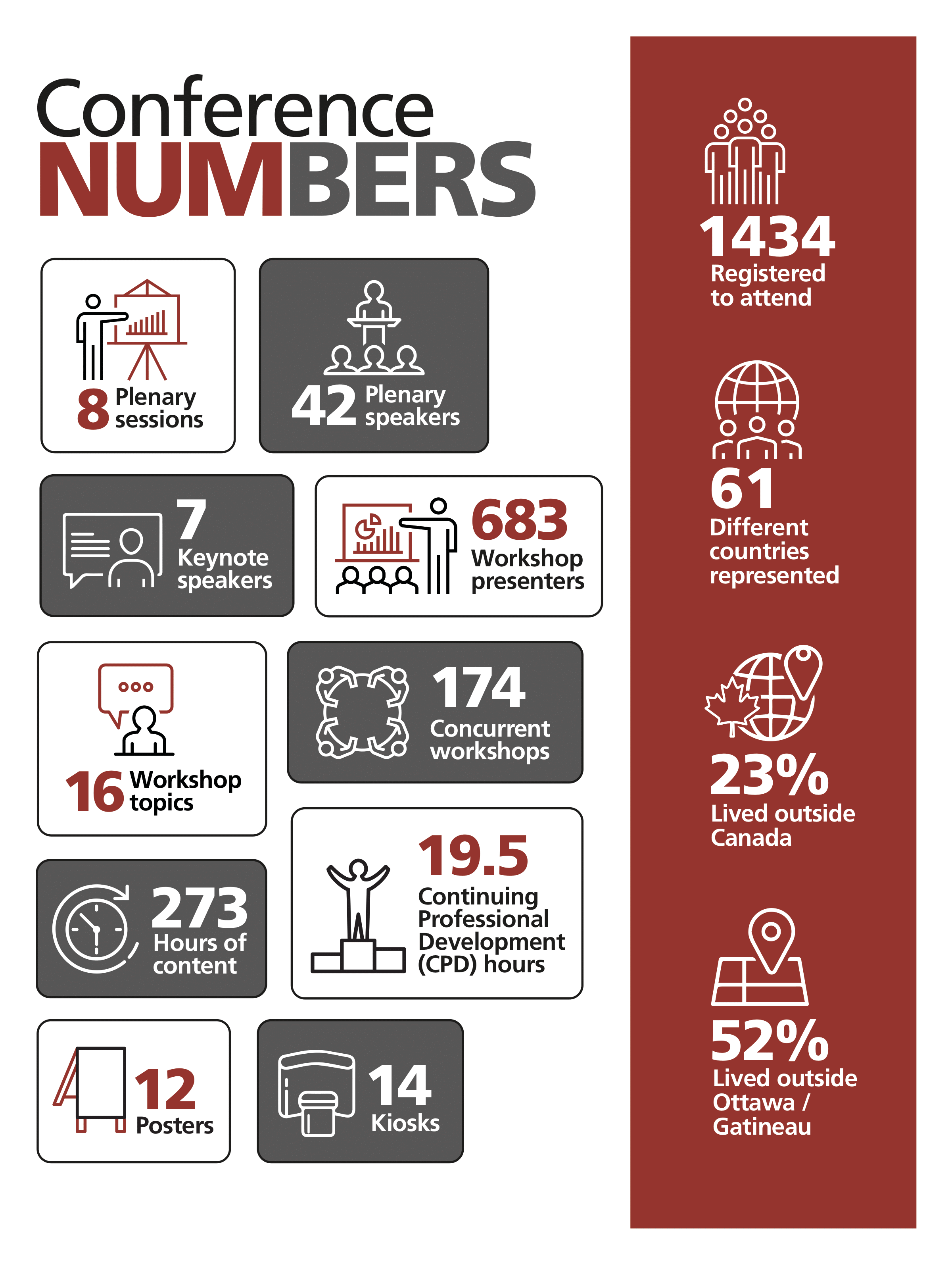
Alternative text: conference numbers
- Registered to attend: 1,434
- Different countries represented: 61
- Lived outside Canada: 23%
- Lived outside Ottawa / Gatineau: 52%
- Plenary sessions: 8
- Plenary speakers: 42
- Workshop topics: 16
- Concurrent workshops: 174
- Workshop presenters: 683
- Kiosks: 14
- Hours of content: 273
- Posters: 12
Countries represented
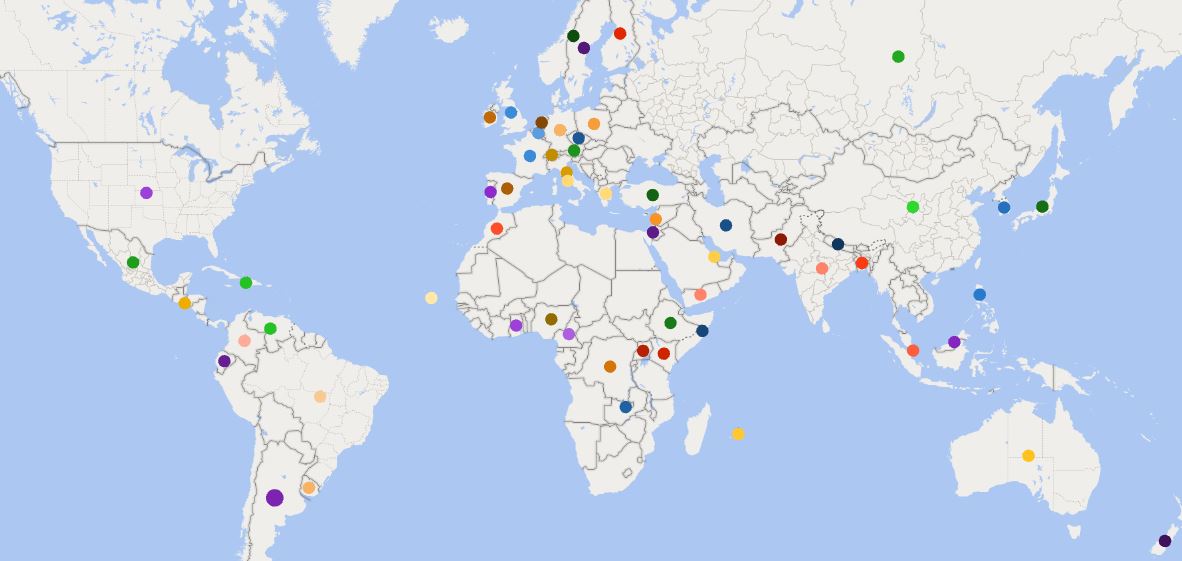
Attendees to the International Metropolis Conference 2019 were from the following 61 countries:
- Canada
- USA
- Australia
- DRC
- Germany
- UK
- Cameroon
- China
- Finland
- Nigeria
- Uganda
- Norway
- Sweden
- France
- Italy
- Korea
- Malaysia
- Singapore
- El Salvador
- Nepal
- Switzerland
- Mexico
- Netherlands
- New Zealand
- Austria
- Ghana
- India
- Japan
- Poland
- Venezuela
- Argentina
- Argentina
- Belgium
- Brazil
- Ecuador
- Lebanon
- Philippines
- Russia
- Spain
- Uruguay
- Colombia
- Bangladesh
- Cape Verde
- Czech Republic
- Ethiopia
- Greece
- Haiti
- Vatican State
- Iran
- Ireland
- Israel
- Kenya
- Mauritius
- Morocco
- Pakistan
- Portugal
- Qatar
- Somalia
- Turkey
- Yemen
- Zambia
Keynote and Plenary Speakers (total 46)
Speakers:
- Plenary: 42
- Keynote: 4
Gender:
- Male: 26
- Female: 20
Affiliation:
- Academia: 14
- Civil Society: 14
- Government: 12
- International Organization: 6
Region:
- North America: 24
- Europe: 12
- Africa 4
- Asia 3
- South America: 3
Registrations by category
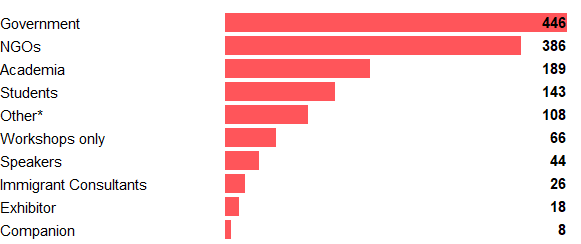
*Includes private companies, international organizations, consulting companies, and other entities.
Alternative text: Registrations by Category
- Government 446
- NGOs: 386
- Academia: 189
- Students: 143
- OtherFootnote * : 108
- Workshops only: 66
- Speakers: 44
- Immigrant consultants: 26
- Exhibitor: 18
- Companion: 8
